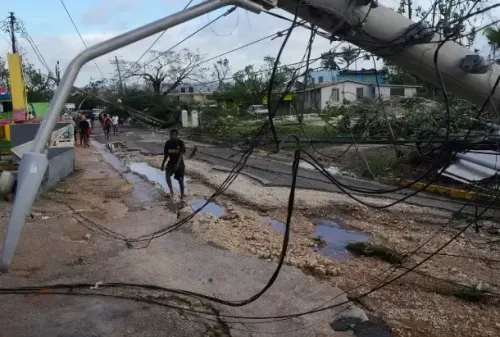What Caused the Cholera Outbreak That Killed Four in Chad's Refugee Camp?

Synopsis
Key Takeaways
- Cholera outbreaks highlight the need for improved sanitation.
- Vigilance and hygiene practices are crucial in preventing spread.
- Chad's refugee camps face unique public health challenges.
- Rapid response and surveillance systems are essential.
- Global collaboration is needed to address health disparities.
N'Djamena, July 25 (NationPress) - At least four individuals have lost their lives due to a cholera outbreak at a refugee camp situated in eastern Chad, as confirmed by a statement from the country's Health Ministry on Friday.
A total of 42 suspected cases have emerged in the Dougui refugee camp, located in the Ouara department of Ouaddai province. The statement noted that samples have been procured and dispatched to the capital, N'Djamena, for confirmatory analysis.
Officials are urging heightened vigilance and strict compliance with hygiene protocols to mitigate the spread of this illness.
The Dougui refugee camp accommodates around 20,000 Sudanese refugees, as reported by the Xinhua news agency.
In June, the World Health Organization (WHO) cautioned that cholera cases in Sudan were anticipated to rise, potentially spilling over into neighboring nations, including Chad, which is host to hundreds of thousands of refugees from Sudan's civil unrest, all living in congested conditions.
According to the WHO, cholera is an acute diarrheal infection caused by ingesting food or water contaminated with the bacterium Vibrio cholerae. It poses a significant global public health risk, underpinning social and economic disparities. Access to safe drinking water, basic sanitation, and hygienic practices is crucial for the prevention of cholera and other waterborne diseases.
Most individuals with cholera experience mild to moderate diarrhea, which can often be effectively treated with an oral rehydration solution (ORS). However, the illness can escalate swiftly, making prompt treatment essential for survival. Severe cases require intravenous fluids, ORS, and antibiotics.
Countries must possess robust epidemiological and laboratory surveillance systems to rapidly identify and monitor outbreaks and inform appropriate responses.
Cholera outbreaks can frequently occur in certain nations, while in others, they may be rare, with significant intervals between incidents.
The disease is closely associated with inadequate access to safe water, basic sanitation, and poor hygiene practices, often exacerbated by conflict, population displacement, climatic events like cyclones, floods, or droughts, and insufficient investment in enhancing water, sanitation, and hygiene (WASH) services and infrastructure.
Reported cholera cases to the WHO have been on the rise in recent years. In 2023, 535,321 cases and 4,007 deaths were recorded by the WHO across 45 countries. The gap between these statistics and the estimates by researchers likely stems from limited surveillance systems and unreported cases due to fears regarding trade and tourism repercussions.








